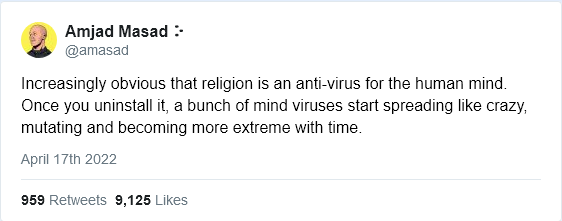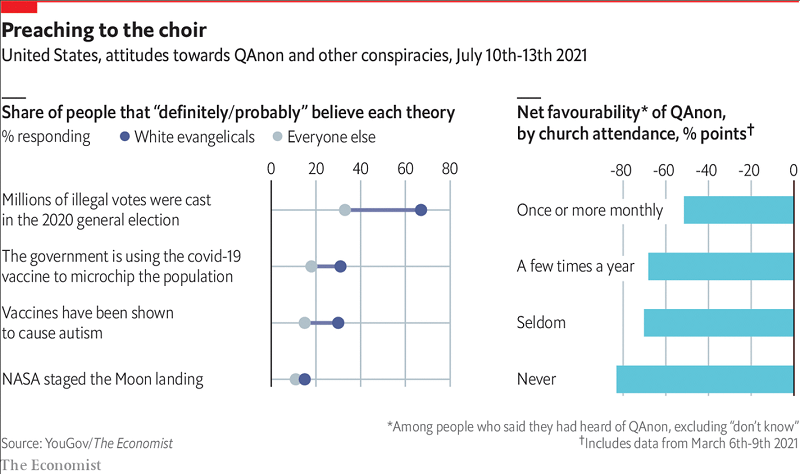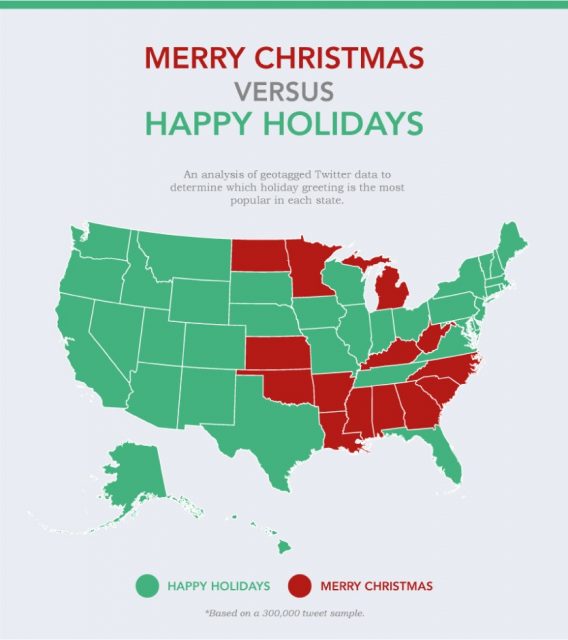Even now I feel queasy using these religious metaphors and these analogies, because they are so pregnant with horror and oppression and mass death – Muslims screaming “Allahu akbar!” as they detonate suicide bombs, Christians with “Kill them all, God will know his own”. But this Buddha must be faced and killed for the sake of my own sanity. If I do not acknowledge and deal with the ways in which I feel like a religious person, I increase my risk that those emotions will sneak up on my thinking and make it unsane.
So I will say it out loud: science is the functional equivalent of worship for the rational human. In contemplating the wonder and vastness of the universe as it is, I find the equivalent of religious awe before the face of God. In struggling to understand the universe, scientists perform work as dedicated, heartfelt and ecstatic as religious devotion. Humility and self-discipline are even more proper to the scientist than they are to the believer; as the true believer seeks to know God’s will without the obstruction of ego, the true scientist seeks understanding of what is without the obstruction of ego.
Religion makes us the offer that if we believe, it will lift us out of ourselves – perfect us, teach us what is mere transient illusion and what is real and eternal. Science makes almost the same offer; that if we accept the discipline of rationality, we can become better than we are and learn what is really true. These two offers rest on very different ground, and religion’s offer is essentially false while science’s is essentially true – but psychologically, we receive both offers in the same way. They both plug into the same basic human fear of death and the unknown, and the same longing for transcendence.
So maybe science is my religion, after all. The question is definitional. Is it “religion” if it duplicates the emotional constellations of religious feeling without investment in the supernatural, or faith, or revelation, or dogma, or any of the usual content of religious belief?
Eric S. Raymond, “Maybe science is my religion, after all”, Armed and Dangerous, 2011-05-18.
January 30, 2024
QotD: Science as religion for the rational
August 14, 2023
“Behold rationalism’s turncoats”
Brendan O’Neill calls out the New Atheist community for their wide adoption of the trans ideology-cum-faith:
We are living through a great showdown between hysteria and reason. On one side stand the adherents to the cult of transgenderism, hawking their hocus pocus about gendered souls and self-authentication through castration. On the other side stand those of us who know that biology is real, and that every cell in the human body is sexed, and that a man is as likely to become a woman as that chalice of wine is to become the blood of Christ during Mass (apologies, Catholics).
You’ll never guess which side some New Atheists are taking in this clash between delusion and truth. The crazy side. The side that says a bloke with a beard and balls can literally be a lesbian. Which is infinitely more cranky than the idea that a bloke with a beard and balls can literally be the Son of God. How did rationalist bros, those secularists on steroids, those Dawkins acolytes whose hobby for years was to make fun of the faithful, become devotees of such a strange, post-truth sect?
One by one, atheists are falling at the altar of trans. This week a Twitterfeed called The New Atheists slammed Richard Dawkins for becoming a TERF. Dawkins is a rarity in the new rationalist ranks: he thinks people with penises are men, not women, just as bread is bread, not the body of Christ. He is “utterly confused”, decreed his angry apostates. Biology “isn’t black and white, it’s a full spectrum of colour just like a rainbow”, they said. This hippyish belief that humans can pick their sex from a multicoloured smorgasbord is entirely an article of faith, of course, not science. Behold rationalism’s turncoats.
We’ve witnessed Neil deGrasse Tyson, America’s best-known scientist, bow to the creed of gender-as-feeling. In a TikTok video he said “XX/XY chromosomes are insufficient” when it comes to reading someone’s sex, because what people feel matters along with their biology. So someone might feel mostly female one day but “80 per cent male” the next, which means they’ll “remove the make-up” and “wear a muscle shirt”. Sir, that’s cross-dressing; it does nothing to refute the truth of chromosomes, which absolutely do tell us what sex a person is. As destransitioner Chloe Cole said to Tyson, you’re “confusing basic human biology with cosmetics”.
We’ve seen Matt Dillahunty, a leading American atheist, promote the mystic cry that there’s a difference between “what your chromosomes are” and your “gender identity”. “Transwomen are women”, he piously declares, perhaps keen to prove that while he might be fond of bashing the old religions, he has not one cross or blasphemous word to say about the new religion. Well, no one wants to be excommunicated from polite society.
Stephen Fry is another godless lover of science who appears to have converted to the trans belief. Phillip Pullman, Stewart Lee and others who were once noisy cheerleaders for rationalism are likewise strikingly reserved on this new ideology, this devotional movement which, among other things, invites young women to submit themselves to bodily mortification in order that they might transubstantiate into “men”. Seems like something a rationalist should question.
July 8, 2023
QotD: The amputation of the soul
Reading Mr Malcolm Muggeridge’s brilliant and depressing book, The Thirties, I thought of a rather cruel trick I once played on a wasp. He was sucking jam on my plate, and I cut him in half. He paid no attention, merely went on with his meal, while a tiny stream of jam trickled out of his severed œsophagus. Only when he tried to fly away did he grasp the dreadful thing that had happened to him. It is the same with modern man. The thing that has been cut away is his soul, and there was a period — twenty years, perhaps — during which he did not notice it.
It was absolutely necessary that the soul should be cut away. Religious belief, in the form in which we had known it, had to be abandoned. By the nineteenth century it was already in essence a lie, a semi-conscious device for keeping the rich rich and the poor poor. The poor were to be contented with their poverty, because it would all be made up to them in the world beyound the grave, usually pictured as something mid-way between Kew Gardens and a jeweller’s shop. Ten thousand a year for me, two pounds a week for you, but we are all the children of God. And through the whole fabric of capitalist society there ran a similar lie, which it was absolutely necessary to rip out.
Consequently there was a long period during which nearly every thinking man was in some sense a rebel, and usually a quite irresponsible rebel. Literature was largely the literature of revolt or of disintegration. Gibbon, Voltaire, Rousseau, Shelley, Byron, Dickens, Stendhal, Samuel Butler, Ibsen, Zola, Flaubert, Shaw, Joyce — in one way or another they are all of them destroyers, wreckers, saboteurs. For two hundred years we had sawed and sawed and sawed at the branch we were sitting on. And in the end, much more suddenly than anyone had foreseen, our efforts were rewarded, and down we came. But unfortunately there had been a little mistake. The thing at the bottom was not a bed of roses after all, it was a cesspool full of barbed wire.
It is as though in the space of ten years we had slid back into the Stone Age. Human types supposedly extinct for centuries, the dancing dervish, the robber chieftain, the Grand Inquisitor, have suddenly reappeared, not as inmates of lunatic asylums, but as the masters of the world. Mechanization and a collective economy seemingly aren’t enough. By themselves they lead merely to the nightmare we are now enduring: endless war and endless underfeeding for the sake of war, slave populations toiling behind barbed wire, women dragged shrieking to the block, cork-lined cellars where the executioner blows your brains out from behind. So it appears that amputation of the soul isn’t just a simple surgical job, like having your appendix out. The wound has a tendency to go septic.
The gist of Mr Muggeridge’s book is contained in two texts from Ecclesiastes: “Vanity of vanities, saith the preacher; all is vanity” and “Fear God, and keep His comandments: for this is the whole duty of man”. It is a viewpoint that has gained a lot of ground lately, among people who would have laughed at it only a few years ago. We are living in a nightmare precisely because we have tried to set up an earthly paradise. We have believed in “progress”. Trusted to human leadership, rendered unto Caesar the things that are God’s — that approximately is the line of thought.
Unfortunately Mr Muggeridge shows no sign of believing in God himself. Or at least he seems to take it for granted that this belief is vanishing from the human mind. There is not much doubt that he is right there, and if one assumes that no sanction can ever be effective except the supernatural one, it is clear what follows. There is no wisdom except in the fear of God; but nobody fears God; there fore there is no wisdom. Man’s history reduces itself to the rise and fall of material civilizations, one Tower of Babal after another. In that case we can be pretty certain what is ahead of us. Wars and yet more wars, revolutions and counter-revolutions, Hitlers and super-Hitlers — and so downwards into abysses which are horrible to contemplate, though I rather suspect Mr Muggeridge of enjoying the prospect.
George Orwell, “Notes on the Way”, Time and Tide, 1940-03-30.
February 7, 2023
QotD: The misery of certainty
No one else on this earth, I assure you, is so dogmatically certain of anything as ivory tower types are of everything. What they believe today might be 180 degrees from what they believed yesterday, but they still believe it with a fanatical zeal that would make Torquemada blush. Whatever “it” is, it is the capital-T Truth, and they alone possess it …
So why are they always so fucking miserable?
Let’s stipulate, for instance, that gender really is just a social construction. Even if it’s not, you’re dogmatically certain of this. Crucially, everyone else in your world is equally dogmatically certain, so even if it’s not, it is. Shouldn’t you be much, much, much happier? So you’re really a wingless golden-skinned dragonkin. Cool. Everyone else is 100% on board with this. You should be the happiest wingless golden-skinned dragonkin on earth … but you’re not. You’re miserable, and you do your damnedest to make every single other person you come in contact with miserable, too.
As a wise man once put it, if you run into an asshole in the morning, well, you just ran into an asshole. If you run into nothing but assholes all day, then you’re the asshole.
Same question to atheists. I can understand nonbelievers being tormented by their uncertainty, but an atheist is dogmatically certain there’s no god … so why aren’t y’all happier? Why, exactly, does the kid with cancer make you mad? The universe, you’re sure, is nothing but the random collision of atoms. It sucks for the kid that those atoms collided in that particular way, but why are you mad? More to the point, why are you mad? It’s like getting mad at gravity for that apple bonking you on the head. There’s no cosmic injustice without cosmic justice. I’d expect a zenlike calm, but instead, every time I write something about atheism (which I really don’t very often), I get a whole bunch of sour, bitter, angry atheists dropping in to tell me that I’m the asshole.
Severian, “The Emotion is the Tell”, Rotten Chestnuts, 2020-01-24.
August 12, 2022
Testing the old saying about those who believe in nothing will believe anything
At Astral Codex Ten, Scott Alexander considers the old saying — often mis-attributed to G.K. Chesterton or C.S. Lewis:
There’s a popular saying among religious apologists:
Once people stop believing in God, the problem is not that they will believe in nothing; rather, the problem is that they will believe anything.
Big talk, although I notice that this is practically always attributed to one of GK Chesterton or CS Lewis, neither of whom actually said it. If you’re making strong claims about how everybody except you is gullible, you should at least bother to double-check the source of your quote.
Still, it’s worth examining as a hypothesis. Are the irreligious really more likely to fall prey to woo and conspiracy theories?
This Economist article examined the question and concluded the opposite. See especially this graph:
“White evangelicals” are more likely to believe most measured conspiracy theories, and churchgoers were more likely to believe in QAnon in particular.
There’s an obvious confounder here: the authors are doing the usual trick where they cherry-pick right-wing examples of something bad, show that more right-wingers are in favor of them, then conclude that Science Has Proven Right-Wingers Are Bad. QAnon, illegal votes, and COVID microchips are inherently right wing conspiracy theories; vaccines/autism has probably become right-coded post-COVID. Only the moon landing seems politically neutral, and it’s hard to tell if there’s a real difference on that one. So this just tells us that white evangelical church-goers are further right than other people, which we already know.
These data still deflate some more extreme claims about religion being absolutely protective against conspiracy theories. But I was interested in seeing how people of different faiths related to politically neutral conspiracies.
July 11, 2022
Well, we were overdue for another “Great Awakening”, but this time it’s woke
In the Neo-Ciceronian Times, Theophilus Chilton outlines why it’s more sensible to regard today’s progressives as devout cultists rather than persuaded political activists:
You may not have been aware of it, but a religious revival has been sweeping America for the past few years. However, rather than the old-time religion of Christian piety, it’s a new religion with new idols and a new direction. Yet, not entirely new — it’s the latest phase in an evolving revolutionary belief system that has consciously set itself against every aspect of traditional American culture and society. Whereas earlier progressivism made an effort to appear to integrate itself into earlier American paradigms even as it was acting to overturn them, the current religion of Woke Progressivism has completely excised itself from any pretension of respect for previous Americanism.
Some on the Right balk at the terminology of referring to woke progressivism as a “religion”. After all, hasn’t the modern Left been characterised by a rejection of religion? By an increasingly overt atheism that not only denies traditional religion, but actively subverts and mocks? Yet, unlike European modes of leftism that have remained more within the boundaries of orthodox Marxism-Leninism, official atheism has never been able to gain more than a toehold in the United States. The American temperament is a religious one and therefore requires some object of piety towards which it is directed.
For the Left, this new object of piety was channeled into cultural Marxism, a form of New Leftism that has successfully managed to take over nearly every institution — government, corporate, cultural — in this country. It did so by providing a more comprehensive program, one that was as much cultural subversion and replacement as it was “traditional” economic leftism, than older forms of socialism. This new leftism, which in its full floruit is the woke progressivism we see today, provides a totalising replacement ideology that seeks to sweep away everything that came before it.
But is this new belief system a religion? I believe that it definitely can be thought of as one, since it displays all the typical sociological patterns found in religions as they have been found throughout history, plus a few that are typical of cult groups as they’re observed today.
To begin, woke progressivism has a precisely defined and systematically enforced body of doctrines which are to be believed, not rationalised. The fluidity of gender, the naturalness of homosexuality, the evil of whiteness — all of these and much more are to be received by simple faith. But these aren’t randomly chosen. They have overarching doctrinal bases that fit within the larger progressive ideological agenda. Put together, these constitute an interlocking body of progressive doctrine that provides a comprehensive ideology to its followers.
Yet at the same time, woke progressivism does have a means of receiving new revelation and new interpretation via its own body of canonical authorities who then pass on this doctrine to the larger body of the woke “church”. This is done primarily through means of the narrative-shaping performed by major media outlets working in conjunction with elements within government, NGOs, and academia (the complex of which is what neoreactionaries often refer to as “the Cathedral”). Indeed, that process has been at work for decades — e.g. it is how the Afrocentrism of the 1980s went from being an odd, laughable academic quirk to being received doctrine which naysaying can cause you to lose your job. Have you ever noticed how when some new element of the progressive narrative hits, whether it’s a fundamental element of ideology or simply how to think about some current news event, that progressives seem to adopt it all at once?
There’s a reason for that. Once a change or addition is decided, the doctrine is swiftly promulgated to all of the local parishes and becomes a received and accepted part of the faith.
December 22, 2021
Repost – “Merry Christmas” versus “Happy Holidays” versus “Happy Midwinter Break”
L. Neil Smith on the joy-sucking use of terms like “Happy Midwinter Break” to avoid antagonizing the non-religious among us at this time of year:
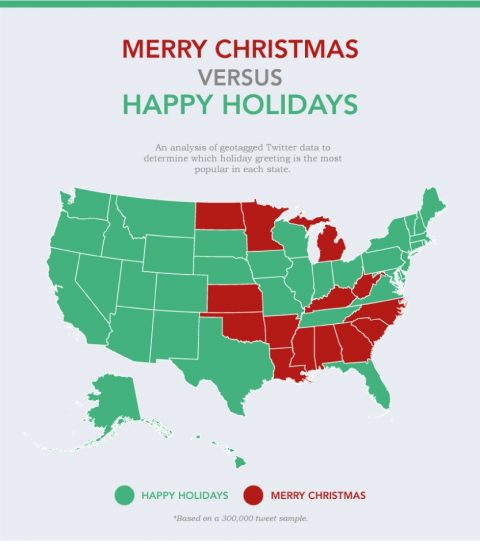
Original infographic from Treetopia – https://www.treetopia.com/Merry-Christmas-vs-Happy-Holidays-a/304.htm
Conservatives have long whimpered about corporate and government policies forbidding employees who make contact with the public to wish said members “Merry Christmas!” at the appropriate time of the year, out of a moronic and purely irrational fear of offending members of the public who don’t happen to be Christian, but are Jewish, Muslim, Hindu, Buddhist, Sikh, Jain, Rastafarian, Ba’hai, Cthuluites, Wiccans, worshippers of the Flying Spaghetti Monster, or None of the Above. The politically correct benediction, these employees are instructed, is “Happy Holidays”.
Feh.
As a lifelong atheist, I never take “Merry Christmas” as anything but a cheerful and sincere desire to share the spirit of the happiest time of the year. I enjoy Christmas as the ultimate capitalist celebration. It’s a multiple-usage occasion and has been so since the dawn of history. I wish them “Merry Christmas” right back, and I mean it.
Unless I wish them a “Happy Zagmuk”, sharing the oldest midwinter festival in our culture I can find any trace of. It’s Babylonian, and celebrates the victory of the god-king Marduk over the forces of Chaos.
But as anybody with the merest understanding of history and human nature could have predicted, if you give the Political Correctness Zombies (Good King Marduk needs to get back to work again) an Angstrom unit, they’ll demand a parsec. It now appears that for the past couple of years, as soon as the Merry Christmases and Happy Holidayses start getting slung around, a certain professor (not of Liberal Arts, so he should know better) at a nearby university (to remain unnamed) sends out what he hopes are intimidating e-mails, scolding careless well-wishers, and asserting that these are not holidays (“holy days”) to everyone, and that the only politically acceptable greeting is “Happy Midwinter Break”. He signs this exercise in stupidity “A Jewish Faculty Member”.
Double feh.
Two responses come immediately to mind, both of them derived from good, basic Anglo-Saxon, which is not originally a Christian language. As soon as the almost overwhelming temptation to use them has been successfully resisted, there are some other matters for profound consideration…
December 23, 2020
Repost – “Merry Christmas” versus “Happy Holidays” versus “Happy Midwinter Break”
L. Neil Smith on the joy-sucking use of terms like “Happy Midwinter Break” to avoid antagonizing the non-religious among us at this time of year:

Original infographic from Treetopia – https://www.treetopia.com/Merry-Christmas-vs-Happy-Holidays-a/304.htm
Conservatives have long whimpered about corporate and government policies forbidding employees who make contact with the public to wish said members “Merry Christmas!” at the appropriate time of the year, out of a moronic and purely irrational fear of offending members of the public who don’t happen to be Christian, but are Jewish, Muslim, Hindu, Buddhist, Sikh, Jain, Rastafarian, Ba’hai, Cthuluites, Wiccans, worshippers of the Flying Spaghetti Monster, or None of the Above. The politically correct benediction, these employees are instructed, is “Happy Holidays”.
Feh.
As a lifelong atheist, I never take “Merry Christmas” as anything but a cheerful and sincere desire to share the spirit of the happiest time of the year. I enjoy Christmas as the ultimate capitalist celebration. It’s a multiple-usage occasion and has been so since the dawn of history. I wish them “Merry Christmas” right back, and I mean it.
Unless I wish them a “Happy Zagmuk”, sharing the oldest midwinter festival in our culture I can find any trace of. It’s Babylonian, and celebrates the victory of the god-king Marduk over the forces of Chaos.
But as anybody with the merest understanding of history and human nature could have predicted, if you give the Political Correctness Zombies (Good King Marduk needs to get back to work again) an Angstrom unit, they’ll demand a parsec. It now appears that for the past couple of years, as soon as the Merry Christmases and Happy Holidayses start getting slung around, a certain professor (not of Liberal Arts, so he should know better) at a nearby university (to remain unnamed) sends out what he hopes are intimidating e-mails, scolding careless well-wishers, and asserting that these are not holidays (“holy days”) to everyone, and that the only politically acceptable greeting is “Happy Midwinter Break”. He signs this exercise in stupidity “A Jewish Faculty Member”.
Double feh.
Two responses come immediately to mind, both of them derived from good, basic Anglo-Saxon, which is not originally a Christian language. As soon as the almost overwhelming temptation to use them has been successfully resisted, there are some other matters for profound consideration…
October 18, 2020
QotD: Nietzsche’s concept of “eternal recurrence”
In making Nietzsche’s eternal recurrence the theme of this book, Gillespie has set himself a huge task. Not only is it one of the philosopher’s weakest and most unconvincing theses, it is the one that sits in opposition to nearly everything else he wrote. For Nietzsche, despite his writing appearing wistful and gothic Romantic, was essentially an empiricist. He had no time for the dualism of Plato and only a fleeting but unconvinced interest in Kantian metaphysical idling about what lay beyond the tangible world. Nietzsche wrote that all there was for sure was the here and now.
This is exactly why he was not a militant atheist in the way we understand the expression today. He felt no need to concern himself with the veracity of Christianity’s claims about the afterlife, something we cannot be sure about. He seldom railed against the theological pretensions of Christianity or the absurdity of religion because to him the only thing that mattered was how religion affected us. He objected to Christianity because he saw it as nihilist and life-negating. It taught people to be meek, humble and to accept their lot. Nietzsche was an empiricist in that he wanted people to fulfil their life in the here and now, something that Christianity was hostile to.
Yet Nietzsche’s eternal recurrence belongs strangely to the realm of metaphysics and dualism. Its fatalism and determinism contradicts Nietzsche’s exhortation for each of us to become our own masters and to become who we truly are. While he did not believe in free will, he did believe that the Übermensch could harness and master the forces of his inner “will to power”. Contrarily, the eternal recurrence condemns us to history and supernatural fate. The notion of “eternal recurrence” reeks too much of his youthful dalliance with Schopenhauerian metaphysics.
This is perhaps why Nietzsche rarely mentioned it, and made even less effort to explain it in the books published in his lifetime. It seems too much of a flight of fancy, and the only time he spoke of it in all seriousness is when he recounted one day in August 1881, when walking in the Swiss mountains, when he had a kind of strange, rapturous religious experience – the day when the notion of “eternal recurrence” came to him in the first place.
Patrick West, “Nietzsche and the struggle against nihilism”, Spiked, 2018-08-03.
October 6, 2020
Rowan Atkinson Live – The devil Toby welcomes you to hell
Rowan Atkinson Live
Published 29 Jul 2010In this sketch, Rowan plays the devil, also known as “Toby”, he welcomes new people to hell.
Selected Highlights from Rowan’s stand up tours during the years 1981 to 1986.
Whether mesmerising us with the sheer visual mastery of Mr. Bean, beguiling us with the acerbic wit of Edmund Blackadder, or simply entertaining us as the suave, but rather hapless British Secret Agent Johnny English, you surely won’t have escaped the comic genius that is Rowan Atkinson.
In Rowan Atkinson Live, co-written with Richard Curtis (4 Weddings & a Funeral, Notting Hill, Love Actually) and Ben Elton, Atkinson runs the whole gamut of his remarkably versatile 30 year career, with sketches, mimes and monologue’s that are guaranteed to have you shedding tears of laughter. Performing live on stage alongside “straight man” Angus Deayton, the show features a number of original and familiar routines, including sketches that appeared in the original Mr. Bean series.
March 14, 2020
“The people who write such things are thinking with their epidermis and genitalia, which is to say they’re not thinking at all”
In Quillette, Matt Johnson remembers the great anti-identitarian writer and speaker, Christopher Hitchens:

Christopher Hitchens speaking at The Amaz!ng Meeting held at the Riviera Hotel, Las Vegas, Nevada on 20 January 2007.
Photo detail by ensceptico via Wikimedia Commons.
Hitchens thought fearlessly. As Martin Amis put it, he liked “the battle, the argument, the smell of cordite.” This is why he told the publisher of God is Not Great: How Religion Poisons Everything to organize a book tour that ran through the pulpits of the American South instead of remaining confined to the coasts. It’s why he relished every opportunity to lambaste Bill and Hillary Clinton in front of liberal audiences. It’s why he went after Mother Teresa and Princess Diana. He was an inveterate iconoclast — if there was a bloated reputation to puncture or a cherished dogma to deflate, he saw it as a duty and a pleasure to do so.
It’s no surprise that this oppositional inclination, coupled with blistering rhetorical ability, made Hitchens a deadly debater. After his death in December 2011, countless tributes and articles about Hitchens emphasized what a force he was in the studio and on the debate stage — his erudition and wit, his fluency, his seemingly superhuman memory. Hitchens is unforgettable for all these reasons, but people don’t miss him because he could turn a phrase or win an argument on CNN — they miss him because he thought for himself and refused to apologize for it. He didn’t want to write and speak as the representative of a community: “My own opinion is enough for me,” he told the audience at a debate on free speech in 2007, “and I claim the right to have it defended against any consensus, any majority.”
“Unpopular ideas can be silenced, and inconvenient facts kept dark, without the need for any official ban,” Orwell wrote in his original introduction to Animal Farm (which was, ironically, suppressed). He continued: “Anyone who challenges the prevailing orthodoxy finds himself silenced with surprising effectiveness.” While there was far more official censorship in Orwell’s time, we’re living through an era of pervasive self-censorship, and as Packer explains, this type of silencing is “more insidious than the state-imposed kind, because it’s a surer way of killing the impulse to think, which requires an unfettered mind.”
[…]
Hitchens detested tribal and parochial feelings of any kind, which is why he was dismayed when he witnessed the emergence of identity as a catalyst for political mobilization in the late 1960s and early 1970s. In his memoir, Hitch-22, Hitchens attacked radicals who thought it was “enough to be a member of a sex or gender, or epidermal subdivision, or even erotic ‘preference,’ to qualify as a revolutionary.” When Hitchens first heard the expression “the personal is political,” he knew “as one does from the utterance of any sinister bullshit that it was — cliché is arguably forgivable here — very bad news.” As he put it in a 2008 article:
People who think with their epidermis or their genitalia or their clan are the problem to begin with. One does not banish this specter by invoking it. If I would not vote against someone on the grounds of ‘race’ or ‘gender’ alone, then by the exact same token I would not cast a vote in his or her favor for the identical reason.
It’s easy to imagine what Hitchens would have thought about a recent New York Times headline that declared “The Next President Should Not Be a Man” or a prominent writer and activist who announced that she “will not support white male candidates in the Dem primary.” The people who write such things are thinking with their epidermis and genitalia, which is to say they’re not thinking at all. You don’t have to bother defending candidates’ principles and positions when gender and race are the only relevant variables.
January 6, 2020
QotD: Faith
Faith felt good, faith always feels good, it probably feels better than heroin and that’s why faith has done much more damage.
[…]What’s the difference between God and a sock monkey? There is a sock monkey.
Penn Jillette, Sock (quoted in Reason December 2004).
December 27, 2019
A Christmas 2.0? – Kwanzaa – December 26th – TimeGhost of Christmas Past – DAY 3
TimeGhost History
Published 26 Dec 2019It is in the Civil Rights Movement of the 1960s, that a young doctor of African studies decides to create his own holiday in California. Half a century later and this holiday has now become the nation-wide Kwanzaa.
Join us on Patreon: https://www.patreon.com/TimeGhostHistory
Hosted by: Indy Neidell
Written by: Rune Væver Hartvig and Spartacus Olsson
Directed by: Spartacus Olsson and Astrid Deinhard
Executive Producers: Bodo Rittenauer, Astrid Deinhard, Indy Neidell, Spartacus Olsson
Creative Producer: Joram Appel
Post-Production Director: Wieke Kapteijns
Research by: Rune Væver Hartvig
Edited by: Mikołaj Cackowski
Sound design: Marek KamińskiColorization by:
Julius Jääskeläinen – https://www.facebook.com/JJcolorization/Sources:
valphotography https://flic.kr/p/6yoUEF
Emilio Labrador https://flic.kr/p/65sBT1
Robert Couse-Baker https://flic.kr/p/b2oyrr
Boston City Archives
From the Noun Project:
umoja by Travis Avery
kinara by Travis Avery
Human by AngelinaSoundtracks from Epidemic Sound:
Howard Harper-Barnes – “A Sleigh Ride Into Town”
Zauana – “Encountering the Unknown”
Sahara Skylight – “Streams of Africa”
Sahara Skylight – “Arriving in Ghana”
Sight of Wonders – “Wildlife Sunrise”A TimeGhost chronological documentary produced by OnLion Entertainment GmbH.
From the comments:
TimeGhost History
17 minutes ago
Today, December 26, our TimeGhost of Christmas Past looks back in the not-too-distant history – in fact into a time in history when some of us here were alive. See, in 1966, Dr. Maulana Karenga decides to create his own holiday in the midst of the holiday season, and, as you’ll see, the rest is history. Now, before some of you become all judgemental and begin shouting in the comment section, remember what Indy says in the video. Think twice before you write something, and please adhere to our community guidelines. And even if you have something controversial to say or not, we’d still like you to share some holiday cheer with us by supporting us on Patreon. It is because of our Patreons that we can fly back into the past and their contributions are vital. See you tomorrow!
December 23, 2019
Repost – “Merry Christmas” versus “Happy Holidays” versus “Happy Midwinter Break”
L. Neil Smith on the joy-sucking use of terms like “Happy Midwinter Break” to avoid antagonizing the non-religious among us at this time of year:
Conservatives have long whimpered about corporate and government policies forbidding employees who make contact with the public to wish said members “Merry Christmas!” at the appropriate time of the year, out of a moronic and purely irrational fear of offending members of the public who don’t happen to be Christian, but are Jewish, Muslim, Hindu, Buddhist, Sikh, Jain, Rastafarian, Ba’hai, Cthuluites, Wiccans, worshippers of the Flying Spaghetti Monster, or None of the Above. The politically correct benediction, these employees are instructed, is “Happy Holidays”.
Feh.
As a lifelong atheist, I never take “Merry Christmas” as anything but a cheerful and sincere desire to share the spirit of the happiest time of the year. I enjoy Christmas as the ultimate capitalist celebration. It’s a multiple-usage occasion and has been so since the dawn of history. I wish them “Merry Christmas” right back, and I mean it.
Unless I wish them a “Happy Zagmuk”, sharing the oldest midwinter festival in our culture I can find any trace of. It’s Babylonian, and celebrates the victory of the god-king Marduk over the forces of Chaos.
But as anybody with the merest understanding of history and human nature could have predicted, if you give the Political Correctness Zombies (Good King Marduk needs to get back to work again) an Angstrom unit, they’ll demand a parsec. It now appears that for the past couple of years, as soon as the Merry Christmases and Happy Holidayses start getting slung around, a certain professor (not of Liberal Arts, so he should know better) at a nearby university (to remain unnamed) sends out what he hopes are intimidating e-mails, scolding careless well-wishers, and asserting that these are not holidays (“holy days”) to everyone, and that the only politically acceptable greeting is “Happy Midwinter Break”. He signs this exercise in stupidity “A Jewish Faculty Member”.
Double feh.
Two responses come immediately to mind, both of them derived from good, basic Anglo-Saxon, which is not originally a Christian language. As soon as the almost overwhelming temptation to use them has been successfully resisted, there are some other matters for profound consideration…
December 8, 2019
The “Church of Atheism” doesn’t get charitable status … this time
Colby Cosh on the recent court decision on the Church of Atheism’s attempt to qualify as a church — and receive the tax benefits — under Revenue Canada’s rules:
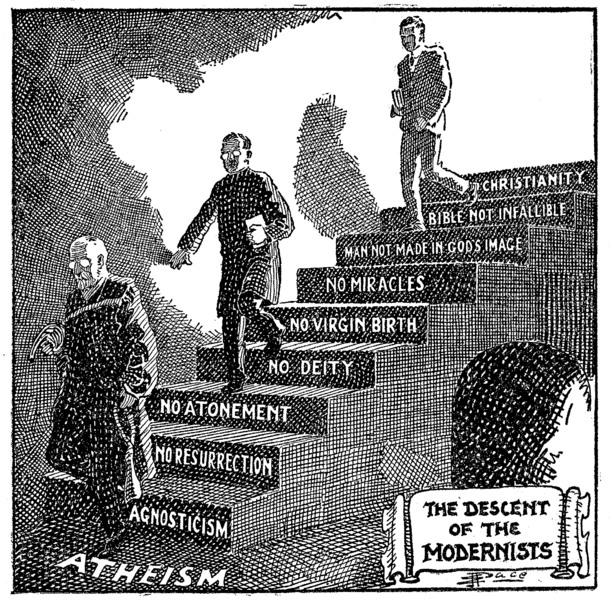
“The Descent of the Modernists”, by E.J. Pace, first appearing in his book Christian Cartoons, published in 1922.
Public domain via Wikimedia Commons.
Last week the Federal Court of Appeal upheld Revenue Canada’s rejection of an application for charitable status made by a “Church of Atheism” tucked away in Ontario’s Lanark Highlands. The idea of making a gesture like this has probably occurred to every atheist who looks around at a world of tax-exempt churches and wonders why his kind is excluded from the gravy train. (Clergymen pay tax on their income, but they have access to a generous residential deduction, and any professional expenses covered by the church go untaxed.)
The fact is that the “Church’s” efforts were a bit amateurish and confused. But they may, like a doomed military reconnaissance, have revealed weaknesses in the anomalous exclusion of atheists from religious tax exemptions.
These weaknesses cannot be any big secret. You probably remember the Supreme Court’s Mouvement laïque québécois v. Saguenay decision of 2015 — that’s the case in which the Quebec Court of Appeal had ruled that a statue of Christ with an electrically illuminated Sacred Heart was “devoid of religious connotation.” The Supreme Court, perhaps suppressing a chuckle or two, proceeded to unanimously overturn the Quebec ruling and expound the concept that the Canadian state has a Charter-based “duty of religious neutrality” (except, of course, where the constitution explicitly specifies otherwise, as with Catholic schools). Government, the SCC insisted, “must neither favour nor hinder any particular belief, and the same holds true for non-belief.”
Given that this is our law, what can be the problem with a “Church of Atheism”? Good question! Justice Marianne Rivoalen, writing on behalf of a three-judge Federal Court panel, confirmed the general point that there is a state duty of religious neutrality; in fact, even Revenue Canada, acting as the respondent, conceded this.
But the court simply ruled, without any logical elucidation, that “the Minister (of Revenue)’s refusal to register the appellant as a charitable organization does not interfere in a manner that is more than trivial or insubstantial with the appellant’s members’ ability to practise their atheistic beliefs. The appellant can continue to carry out its purpose and its activities without charitable registration.”


